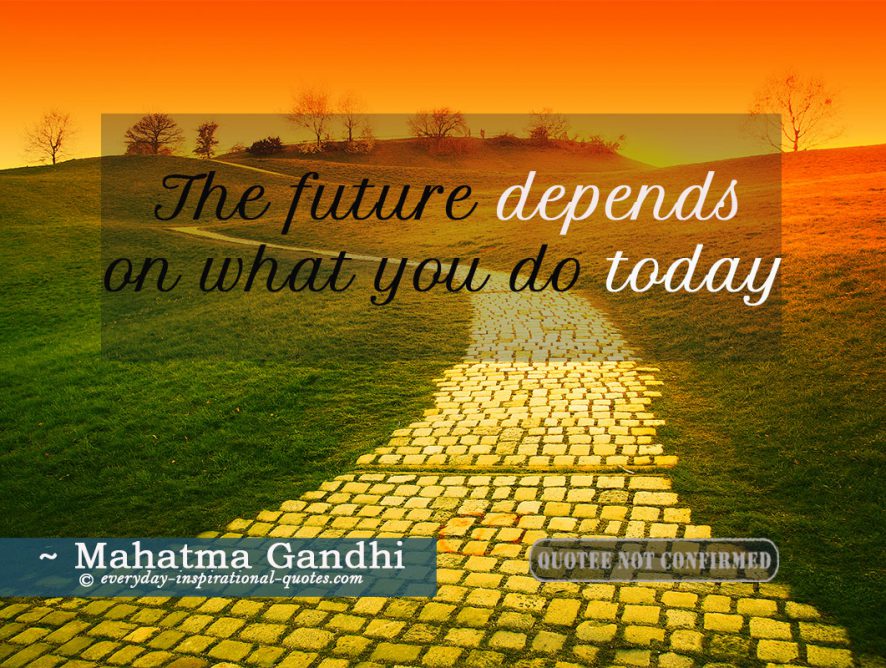The future depends on what you do today – is a common saying which is thought to be said by Mahatma Gandhi. However, very few reliable sources prove that this is the case. That being said, Universities Scotland , the representative body of Scotland’s higher education, does attribute this to Gandhi in this blog post. Despite that, there is no actual evidence of the quotation in any of his works .
Nevertheless, Gandhi was widely known as a man of action, who has lived a long life of activism and nonviolent resistance in pursuit of Indian independence from the British rule. This makes this quote relatively applicable, as his life was full of actions that continue to resonate with many decades after his death.
Who was Gandhi?
Mahatma Gandhi was born Mohandas Karamchand Gandhi in 1869. As a child, he was described by his sister as energetic and restless, always either playing or roaming around the neighborhood. Classic Indian literature, particularly the stories of Shravana and Harishchandra had a strong impact on Gandhi which lasted throughout his lifetime as he himself wrote in his autobiography.
Both characters, Shravana and Harishchandra influenced Gandhi into holding up truth and love as the supreme values, this are constantly reflected in a diverse number of his works. For example, in Basic Education (1951) a posthumous publication, he wrote:
Gandhi would eventually go on to become a lawyer after studying in University College London. His experiences in South Africa as a lawyer facing racial discrimination molded his views on politics and ethics, which would later pave the way for his lifelong activism against it and ultimately for India’s independence from the British rule.Truth alone will endure, all the rest will be swept away before the tide of time. Mahatma Gandhi
What is the meaning of the quote?
While the quote itself is unverified, it may still be applied to Gandhi’s philosophy and general outlook about the world.
Put it simply, the quote means that while our fate is uncertain, our actions in the present can certainly influence our own future and that of others around us for better or for worse. As a young man, Gandhi lived through times when racial discrimination against Indians was at its peak. In those times, Gandhi never had any certainty on when it would end or if it would end at all.
Yet, this uncertainty did not faze him. Instead, it forced him into action, organizing minority communities to assert their rights against discriminatory establishments. From his first experience of discrimination in 1893 all the way until his assassination in 1948 after the British granted India its independence, he never stopped taking action for the benefits of the future of his people.
Indeed, one can say that Gandhi acted not for his own future but for the future of the generations to come. We can observe a similar point of view from John F. Kennedy as well in his speech at the Arkansas State Fairground 1963:
Things don’t just happen, they are made to happen. John F. Kennedy
Dangers of immediate gratification.
As many already know investing today for better tomorrow is usually easier said than done. It is natural to want to enjoy things here and now instead of worrying about the future. Sadly it has been proven time and time again that this strategy tends to bring a negative outcome later down the line, it is therefore wiser to take an opposite approach by delaying all of those pleasure in the moment for a stable, structured and more enjoyable life in the future. Usually this concept is called delayed gratification.
The benefits of delayed gratification have been studied by psychologists for years. For example, one study has found that willingness to postpone an immediate reward to gain more significant rewards in the future is closely related to one’s health, wealth, and happiness.

This mindset lies in knowing that the immediate reward has less value at the moment rather than the future. So, for example, if you could choose between having $1 now or $20 tomorrow, you would, of course, pick the $20. But choices in life aren’t always that simple and straightforward, immediate rewards tend to look very valuable at the moment, so it’s important to be level-headed and have a mindset oriented towards the near distant future.
Understand, those who live only for today are not building a good foundation for their future lives. The truth is, we are at our most capable when we are young. Our older selves will not be as strong or as energetic as we are now. That’s why we owe it to our future selves to work on creating a better life so that we can enjoy it when we can no longer fend for ourselves.

Cultivating delayed gratification habit
- Having a vision
- Start small
- Being organized
- Habit Replacement
While this may sound a bit cliché, but the most potent weapon you can have against immediate gratification is to have a long term vision of what a sustained discipline may bring you in the future. If you are, let`s say dieting for the sake of dieting, because its your new year resolution, its trendy or because your friends are doing it, I have bad news for you, you won`t make it. You must first construct a vision of how this deliberate action will bring you the results that you want. And you must want those results, otherwise every other point in this list will not work.
Have a concrete vision of what the results must look like and the a concrete deadline of when you want to have this result.
To cultivate a mindset of delayed gratification, one must start with small things. Indeed, habits are more easily cultivated by doing small things consistently over a long period of time.
Perhaps you are a person who instantly goes out to buy food whenever you feel hungry. But if you remember that lunch (or dinner) is only a few hours away, you can train yourself to avoid that unhealthy sugary snack. In this process, you train yourself to let go of the habit of having fast food and instead reward yourself with a healthier decision and greater financial savings.
Immediate Gratification is always impulse driven, going back to the dieting example, if you come tired and hungry after work, you have a sink full of dirty dishes, guess what you are going to do… Therefore, to prevent this scenario from ever happening you have to keep yourself organized. Cooking food on specific days, in batches and storing it in the fridge for later is the best way to avoid any impulse fast food eating. Understand, constantly fighting your impulses is a very difficult game and one you want to avoid as much as possible, the better strategy is to avoid provoking those impulses altogether by introducing some schedule or structure into your life.
Once you have created a habit it is usually very difficult to drop it. Even worse a bad habit can leach onto a good or neutral habit. Think drinking coffee and having a cigarette. Now if you ever wanted to stop smoking, every time you take that sip of coffee your impulse kicks in and you find yourself reaching for the lighter. Fortunately, you don`t necessarily need to get rid of a bad habit you could just replace it with a good one.
An example would best demonstrate this point. Let`s say you have a bit of a sweet tooth, and at the end of every meal you have a habit of eating something sweet. Usually, that means chocolate, dessert or even a can of soda.
Lets imagine you have put a “little” bit of weight and your doctor asked you to stop eating so much processed sugar because danger of some health problems. So naturally after every meal you crave something sweet, but what do you do?
You have two options, one – drop the habit altogether, remove any trace of sugar from your house or two – replace the processed sugar with natural sugar, like a fruit. Unfortunately eating just an apple at the end of every meal will hardly work because you are use to something much sweeter than that. But what about picking a sweeter fruit? Could it be grapes/strawberries/kiwis/pineapple or bananas? Do you have a favorite fruit you enjoy? Could you consistently eat it at the end of every meal and still feel somewhat fulfilled?
The importance of investing in your future.
The circumstances we were in when we were 20 years old will not necessarily be the same when we are 50. This makes it essential for us to prepare for the second half of our lives. When we reach the second half of our lives, we generally find the work we’ve been doing to either be boring or at least no longer challenging.

According to Peter Drucker a renowned management consultant and author, there are three solutions to this problem: starting a second career, starting a different career, or working on your old career and a new “side job” simultaneously.
Regardless of your choice, it is always crucial that your actions are oriented towards the future. Hence, whatever you do (or don’t do) right now will create a ripple effect that will be felt long after.
So, the most important thing to ask yourself is, “Where do I want to be in the next 10/20/30 years?” From there, look at your actions and see if they are getting you towards where you want to be. Because big goals in the future can only be achieved with consistent small actions in the present.
If you always live for the present, you will one day look at your past and regret not doing things which you should have done. In fact, regret is more painful when it involves the actions we did not take rather than the ones we did.

